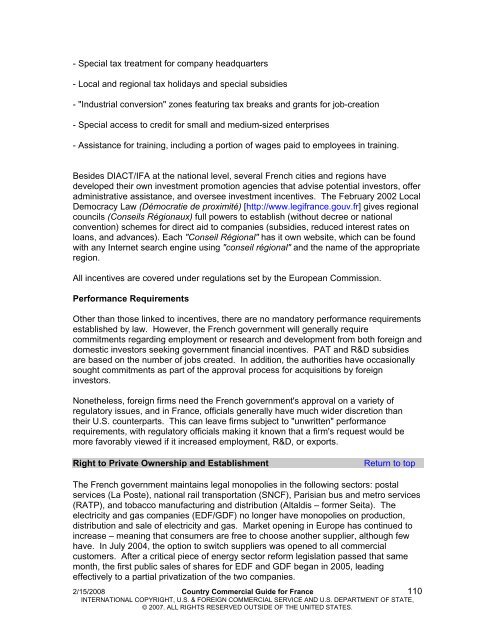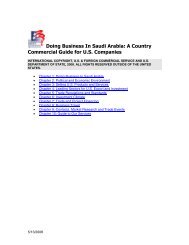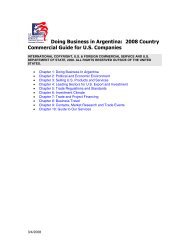Doing Business In (Insert Country Name Here) - BNA
Doing Business In (Insert Country Name Here) - BNA
Doing Business In (Insert Country Name Here) - BNA
You also want an ePaper? Increase the reach of your titles
YUMPU automatically turns print PDFs into web optimized ePapers that Google loves.
- Special tax treatment for company headquarters<br />
- Local and regional tax holidays and special subsidies<br />
- "<strong>In</strong>dustrial conversion" zones featuring tax breaks and grants for job-creation<br />
- Special access to credit for small and medium-sized enterprises<br />
- Assistance for training, including a portion of wages paid to employees in training.<br />
Besides DIACT/IFA at the national level, several French cities and regions have<br />
developed their own investment promotion agencies that advise potential investors, offer<br />
administrative assistance, and oversee investment incentives. The February 2002 Local<br />
Democracy Law (Démocratie de proximité) [http://www.legifrance.gouv.fr] gives regional<br />
councils (Conseils Régionaux) full powers to establish (without decree or national<br />
convention) schemes for direct aid to companies (subsidies, reduced interest rates on<br />
loans, and advances). Each "Conseil Régional" has it own website, which can be found<br />
with any <strong>In</strong>ternet search engine using "conseil régional" and the name of the appropriate<br />
region.<br />
All incentives are covered under regulations set by the European Commission.<br />
Performance Requirements<br />
Other than those linked to incentives, there are no mandatory performance requirements<br />
established by law. However, the French government will generally require<br />
commitments regarding employment or research and development from both foreign and<br />
domestic investors seeking government financial incentives. PAT and R&D subsidies<br />
are based on the number of jobs created. <strong>In</strong> addition, the authorities have occasionally<br />
sought commitments as part of the approval process for acquisitions by foreign<br />
investors.<br />
Nonetheless, foreign firms need the French government's approval on a variety of<br />
regulatory issues, and in France, officials generally have much wider discretion than<br />
their U.S. counterparts. This can leave firms subject to "unwritten" performance<br />
requirements, with regulatory officials making it known that a firm's request would be<br />
more favorably viewed if it increased employment, R&D, or exports.<br />
Right to Private Ownership and Establishment Return to top<br />
The French government maintains legal monopolies in the following sectors: postal<br />
services (La Poste), national rail transportation (SNCF), Parisian bus and metro services<br />
(RATP), and tobacco manufacturing and distribution (Altaldis – former Seita). The<br />
electricity and gas companies (EDF/GDF) no longer have monopolies on production,<br />
distribution and sale of electricity and gas. Market opening in Europe has continued to<br />
increase – meaning that consumers are free to choose another supplier, although few<br />
have. <strong>In</strong> July 2004, the option to switch suppliers was opened to all commercial<br />
customers. After a critical piece of energy sector reform legislation passed that same<br />
month, the first public sales of shares for EDF and GDF began in 2005, leading<br />
effectively to a partial privatization of the two companies.<br />
2/15/2008 <strong>Country</strong> Commercial Guide for France 110<br />
INTERNATIONAL COPYRIGHT, U.S. & FOREIGN COMMERCIAL SERVICE AND U.S. DEPARTMENT OF STATE,<br />
© 2007. ALL RIGHTS RESERVED OUTSIDE OF THE UNITED STATES.












